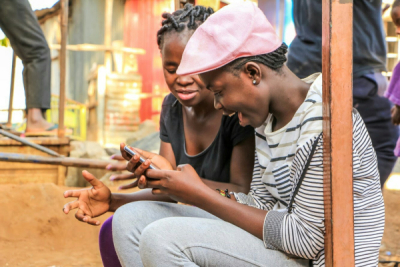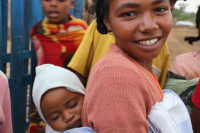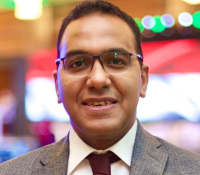In Africa, the volume of funds attracted by fintech startups is growing rapidly. Those startups come up with alternative solutions to address some of the pressing challenges faced by businesses and individuals.
myStash is a fintech solution developed by an eponymous Nigerian startup, founded in 2021. It automatizes the savings process, allowing users to save a preset percentage of their earnings and expenses.
Through its web and mobile apps (the mobile app is available for Android and iPhone users), users can manage their finances and set the percentage of expenses and earnings to save. To do that, they must first register by providing personal information, then link their bank cards to their myStash accounts.
The startup assures that the process is secure and it has no access to sensitive information. On its website, it claims that it has helped over 25,000 customers and hundreds of businesses “make better money moves by helping them save bit by bit in Naira or Dollars.”
The startup also offers a 5-12% interest on the amounts saved. In addition, it enables users to receive part of their salaries in US dollars. Its services are free. This year, it is among the 43 African startups selected for the Social and Business Camp sponsored by the French Development Agency to help startups get themselves known to potential investors for their growth.
Adoni Conrad Quenum
The 2-year program launched by Southbridge A&I and its partners aims to uncover homegrown innovations that have the potential to change the way healthcare supply chains and systems work.
On Monday, Sept. 26, Investing in Innovation Africa unveiled the list of 30 African startups selected for the first cohort of the Investing in Innovation (i3) program.
The selected startups include seven Nigerians, five Kenyans, three South Africans, three Moroccans, two Zimbabweans, two Ugandans, one Cameroonian, one Angolan, one Congolese, one Ivorian, one Ghanaian, one Rwandan, one Senegalese, and one Tunisian.
All of them are in the start-up or growth phase and offer innovative solutions for the distribution of medicines and medical equipment, stock management and financing, authentication, traceability, and medical waste management. They will each receive a US$50,000 grant and support to catalyze growth-oriented partnerships with donors, industry leaders, and institutions. Their market access will also be improved with the various events they will attend throughout the year.
According to Efosa Ojomo, member of the i3 Steering Committee, “i3’s focus on African ingenuity is long overdue – supporting locally-led, market-creating innovations to scale will equip the continent to achieve health gains, generate prosperity and weather future crises.”
Samira Njoya
The difficulties in accessing traditional banking services have motivated African entrepreneurs to develop a multitude of fintech solutions to help both individuals and businesses.
Paiement Pro is a fintech solution developed by Ivorian start-up Amira Global Technologies, founded in 2019. It allows users to collect or issue mobile money and credit card payments online. It also helps them develop their online businesses.
Apart from its web platform, the solution also has an Android app allowing users to register an account by providing a set of information, including name, contact details, geographic location, etc. The startup will later dispatch a sales representative to check users’ activities. After registration, users can access all the features required to set up their online payment or issue payments.
The solution integrates several plugins such as Pro Shop, Pro Agenda, Pro Event, etc. To enable seamless performance, each of the plugins has dedicated features like the QR Code scanner that allows users to authenticate tickets sold using the Event Pro plugin.
To facilitate the processing of transactions carried out via its platform, Amira Global Technologies has partnered with the United Bank of Africa (UBA), mobile operators, Visa and Mastercard. Currently, it operates in Côte d’Ivoire, Benin, Burkina Faso, Niger, Mali, and Senegal. It also eyes the Cameroonian, Congolese, DR Congo, Ghanaian, Nigerian and Togolese markets.
In 2021, it received the National Award for the Women's Digital Initiative of the Year. It was also among the top 50 finalists of the Africa’s Business Heroes competition. This year, the startup is also one of the 43 African start-ups selected for the Social & Inclusive Business Camp sponsored by the French Development Agency.
Adoni Conrad Quenum
As a media and ICT enthusiast, she has over 30 years of professional experience in mentoring, consulting, and venture financing. Her expertise has been honed through the many senior positions she has held in many countries.
Biola Alabi (photo) is a Nigerian businesswoman. Since September 13, 2022, she is a venture partner in Egypt-based venture capital firm Cairo Angels Syndicate Fund (CASF), which focuses on startup tech firms based in the MENA region. With CASF, Mrs. Biola is responsible for origination, investments, portfolio management, and investor relations.
For Biola, who is excited to bring “regional ecosystems together”, when the opportunity came to join CASF, the answer “was a no brainer.”
As an angel investor, advisor, and even member of the board of several startups, Biola Alabi is a global leader. Her certificate in Global Leadership and Public Policy, obtained at Harvard University in 2013, and her certificate in Transformational Leadership obtained at the University of Oxford’s Saïd Business School in 2016, illustrates her global leadership ambitions.
In January 2022, she co-founded Atika Ventures, a women-led venture capital firm. Since 2021, she is the deputy chair of the Lagos Angel Network, which is “committed to providing seed funding, mentoring and access to their business networks to Lagos area start-up entrepreneurs and their early-stage businesses.”
Her professional career began, in 1999, with Bigwords.com, a textbooks search engine. That year, she joined the online platform as a regional marketing manager. In 2003, she joined Sesame Workshop as regional director for sub-Saharan Africa. Five years later, she was appointed general manager for Africa for South African TV channel M-Net Africa.
In 2015, she established the Grooming for Greatness Foundation, a scholarship and mentoring program for promising young talent and entrepreneurs. She then founded Biola Alabi Media and Entertainment, a production company where she is the Senior Advisor and Executive Producer.
In addition to her numerous occupations, she is also a non-executive director of telecom service provider Monty Mobile Holding, since 2015. She is also a non-executive director of Unilever Nigeria Plc, which specializes in the manufacturing of consumer goods.
Melchior Koba
Entrepreneurship is a key component of strategies aimed at addressing youth unemployment in Africa. However, entrepreneurs still face challenges in accessing financing. Several programs are ongoing to address that issue.
U.S. Tech corporation Microsoft recently strengthened its partnership with the African Development Bank (AfDB). According to the press release received by We are Tech on Monday, September 26, the objective of this new partnership is to boost young Africans’ entrepreneurship spirit. It comes after the implementation of the African Development Bank's Youth Entrepreneurship Investment Bank (YEIB) Initiative.
“The strengthening of our partnership with Microsoft on the Youth Entrepreneurship Investment Banks (YEIB) is an important development in our journey towards harnessing Africa’s demographic dividend and facilitating the creation of millions of jobs for young Africans by 2025,” said Solomon Quaynor (photo, left), the African Development Bank’s Vice President for Private Sector, Infrastructure, and Industrialization.
Africa has the youngest population in the world. According to the AfDB, the continent’s population, which is growing fast, is expected to double to over 830 million by 2050. Of the estimated 420 million young Africans aged 15-35, one-third are unemployed and discouraged, another third are in precarious employment, and only one in six has paid employment.
This collaboration, through the Microsoft Africa Transformation Office (ATO), will contribute to the development of youth entrepreneurship ecosystems, but also the creation of new jobs. It will also support digital inclusion in Africa.
“We believe much can be done to help foster youth entrepreneurship by collaborating with the African Development Bank, driving greater economic inclusion for this key segment of the population, and ultimately building a more prosperous society,” said Microsoft Africa Regional Cluster's General Manager, Wael Elkabbany (photo, right).
The partnership will also facilitate the establishment of national institutions through a public-private collaboration model that will increase technical and financial support and capacity building benefiting young entrepreneurs.
Samira Njoya
In the past 30 years, internet connectivity has been the main focus of most countries’ digital transformation programs. With the fourth industrial revolution, priorities have evolved but, many nations are still not ready.
Netherlands-based VPN services provider Surfshark recently unveiled the top 10 African countries whose digital experience improves the quality of life. According to its "2021 Digital Quality of Life Index", those countries are namely South Africa, Mauritius, Kenya, Tunisia, Nigeria, Morocco, Algeria, Ghana, Senegal, and Côte d’Ivoire.
The ten countries were ranked based on five criteria: Internet affordability, Internet quality, electronic infrastructure, e-security, and e-government. By taking action in those five segments, countries modernize public and private services, rendering them more efficient. They also improve their business environments, promote innovation, improve the dynamism of the startup ecosystem, making it more attractive for investors, encourage the population to be actively involved in the development of the digital economy, and promote human development.
Digital quality of life is still modest in those ten countries compared to the global average. Indeed, while the global average -for the 110 countries ranked- is 0.53 out of 0.90 points, the African leader -South Africa- collected just 0.49 points.
Let’s note that some countries perform best in specific index criteria. For instance, Angola, which is not in the top 10 African countries with the best digital quality of life, was the African country with the most affordable internet. Globally, it ranked 17th out of 110 countries.
Similarly, Algeria was the African country with the best internet quality (28th worldwide). Kenya took the lead in “electronic infrastructure” on the continent, coming 58th on the global stage. When it comes to e-security Nigeria was the best African country, the 46th worldwide. Finally, Mauritius has been the African country with the best e-government. In that segment, it was ranked 53rd out of 110 countries worldwide.
Muriel Edjo
In Africa, access to quality healthcare is still quite challenging for a number of reasons. Authorities are implementing programs to help their populations. At the same time, tech entrepreneurs are leveraging technology to offer interesting alternatives.
mTomady is a digital platform developed by an eponymous Malagasy startup. It facilitates access to healthcare for its users by enabling them to subscribe to health insurance via mobile money accounts.
The digital platform was launched in 2019 to provide pregnant women and young mothers access to a portfolio of mobile health services and digital vouchers for subsidized care. Later, in 2020, its legal entity was formed by Elsa Rajemison, Julius Emmrich, and Samuel Knauss to serve everyone.
mTomady “builds and implements technology that lowers financial barriers to healthcare and accelerates progress towards universal healthcare coverage.” It “provides low-income, remote, or otherwise vulnerable families with access to a variety of health financing mechanisms through mobile phones.”
To benefit from its services, users must enroll by dialing a dedicated USSD code or by getting in touch with healthcare providers. Once registered, the user can start paying his/her contributions -either by installments or at once- via mobile money. When the user needs healthcare, he/she will receive funds in his/her mTomady mobile portfolio. That fund, which is different from the mobile money account, will be exclusively used for healthcare services, the purchase of medication, or even pay contributions.
In 2020, mTomady won the Global Health Hub Germany’s innovation award. This year, it is on the list of the 43 African startups that will participate in the Social & Inclusive Business Camp sponsored by the French Development Agency. Its plan is to expand to other African countries, namely Uganda and Ghana where it will be integrated into the national insurance fund’s digital platform.
Adoni Conrad Quenum
Over the past nine years, he has been active in youth education and counseling. His expertise in that path was strengthened by the numerous associative and consulting positions he held during all those years.
Omar El-Barbary (photo) is the co-founder and CEO of OBM Education, an edtech startup that provides academic guidance, training, and professional development courses to young graduates and non-graduates. Thanks to online and face-to-face tools, the startup -founded in 2013- guides young people into sectors and professions most suited to their skills and potential.
In August 2022, Omar successfully led a six-figure raise, from EdVentures, for OBM Education.
The new “investment is quite strategic for our ambitious expansion plans as we will use it to launch our new application, Taleb, which will enable us to provide extended services for our users and to fulfill our mission in ensuring an exceptional career advising experience for the Egyptian students,” Omar said at the time.
The new app, Taleb, has already been launched. It enables access to a wide range of services for students, teachers, and institutions. It also allows students to take remote courses, improving the quality of education.
Apart from his entrepreneurial career, Omar El-Barbary also has a fulfilling and enriching associative and project management career. In February 2015, he was appointed Career Development Manager for the US-based NGO Population Council. Concurrently, he was also the Egyptian Ministry of Youth and Sports’ Youth Skills Project Manager.
In 2017, in Russia, he was the Egyptian representative of Future Team Finland, a network of young professionals working to change the world. Two years later, he became the contractual operations manager for BiznEX Egypt, a trade show for investment and commercial agencies in Egypt and the Middle East. In 2020, he became President and CEO of IQ E-Learning, an educational website.
Melchior Koba
In recent years, many investors have positioned themselves in the African technology market. This influx motivates local tech entrepreneurs to devise interesting solutions for daily life problems.
Abjad Teach is an AI e-learning platform developed by Libyan ed-tech startup Abjad Limited, founded in 2018. It helps schools find the best teachers for their students.
The solution has a mobile app, available for Android and iOS devices. Teachers looking for their first work experience can sign up and showcase their profiles to schools looking for them. "Abjad will provide everything you need to know about your assignment, Contact details, expected pay, school profile, and other important information. You only see the jobs that suit your profile and interests. Get the best match by selecting your favorite schools, geographical area, subjects, and much more," the platform indicates in its welcoming message.
Thanks to artificial intelligence, schools that have open vacancies for teachers will see only the profiles that match their needs. “All you need to do is complete your school profile, upload jobs as required and Abjad will handle the rest of the application and recruitment process,” Abjad explains.
In 2022, Abjad was selected among 43 African start-ups that will participate in the social and inclusive Business Camp program sponsored by the French Development Agency. It is also among the winners of the Emerging Mediterranean program and will participate in the Emerging Valley summit in November.
Adoni Conrad Quenum
With the emergence of digital technologies in Africa, governments are increasingly realizing the importance of the creative economy, which can generate more business opportunities, have a positive impact on livelihoods, and boost the overall economy.
The African Development Bank (AfDB), the Islamic Development Bank (IsDB), and the French Development Agency (AFD) have invested US$618 million in Nigeria's Investment in the Digital and Creative Enterprises (i-DICE) program.
Speaking at the Nigeria International Economic Partnership Forum in New York on Thursday, September 22, AfDB President Akinwumi Adesina (photo) said the funding will support the creation of 225 creative start-ups and 451 small and medium enterprises (SMEs) in the technology sector.
“The future is not just digital, the future will be driven by digital revolution. Today, Nigeria has five of the seven unicorns in Africa and raised almost $1.4 billion of the total of $4 billion raised by fintech companies across Africa in 2021,” Akinwumi Adesina said.
The program's funding is aimed at offsetting the economic downturn caused by the Covid-19 pandemic by expanding the financial and technology sectors in Nigeria. According to the AfDB, in the fourth quarter of 2020, ICT contributed 15.06% of gross domestic product (GDP), compared to 13% during the same period a year earlier. Similarly, the vibrant creative industries generated US$14.4 million in revenue between 2015 and 2018.
Despite such performance, several systemic issues including lack of funding, insufficient infrastructure, skills gap, and limited access to the internet hinder the development of the concerned sectors. The i-DICE launched by the Federal Government of Nigeria, last January, aims to tackle those systemic issues. It targets more than 68 million Nigerians aged 15-35 who are recognized as leaders of innovative, early-stage technology start-ups, as well as leaders of micro, small and medium-sized enterprises in the creative sector. For AfDB president Akiwumi, these businesses could create 6.1 million jobs and contribute US$6.4 billion to the Nigerian economy by 2027.
According to Premium Times Nigeria, the AfDB financing “will help the Government initiative further consolidate Nigeria’s position as Africa’s leading start-up investment destination and as a youth entrepreneurship hub.”
Samira Njoya
More...
Access to justice is sometimes challenging for some individuals because of a lack of financial resources and information. In the Democratic Republic of Congo, a legaltech startup is making it easy and affordable thanks to technologies.
Eve JusticeBot is a digital solution developed by Congolese legaltech startup Justice Chatbot Limited, founded in 2019. It offers free legal help to individuals and connects them to legal professionals through a chatbot, available 24/7.
The digital solution is accessible on the startup’s dedicated platform or via Facebook Messenger. Apart from connecting individuals to legal service providers, it offers free information on every legal aspect. It also helps secure legal documents.
To access the digital solution via Facebook Messenger, users just have to search Eve JusticeBot on Messenger and send a message to start a conversation with the AI chatbot.
Justice Chatbot Limited claims more than 23,634 requests processed and some fifteen legal providers recommended. In addition, it received over 591 kudos from users. The figures prove that “the startup is committed to improving access to justice, notably for individuals without the financial resources required to access legal instruments.”
The startup also offers legal professionals the opportunity to join its cause. To do so, they can submit their applications to join Eve JusticeBot as legal professionals. After a compulsory review -to keep a certain standard-, they can join the pool of legal advisers on the platform.
Eve JusticeBot is among the 43 African startups that will participate in the French Development Agency’s Social & Inclusive Business Camp (SIBC). It will therefore benefit from training, mentorship, and peer exchange. It will also have the opportunity to meet potential investors.
Adoni Conrad Quenum
The solution was developed to reduce the 50 million tons of greenhouse gas emitted yearly by cars seeking parking spaces.
Garini is a smart parking solution developed by an eponymous Algerian startup. It allows users to remotely book parking spaces in major cities in Algeria. The startup behind the solution was founded in 2017, by Nadir Kassoul and two of his friends. The aim was to “connect urban mobility actors with drivers to reduce greenhouse gas emissions or the stress of looking for a parking space,” Nadir Kassoul explains.
The solution has a mobile app, available for Android and iOS devices. Using that app, Garini clients can register an account and subscribe to various bundles. They can also notify the startup when they free parking space to allow another user to be directed to that space.
Currently, the startup is active in Oran and Algiers. To acquire enough parking spaces for its clients, it negotiates with businesses and individuals (hotels, residences, business centers, etc,) that have unused parking spaces. “The spaces dedicated to Garini users are sometimes grouped on a parking building’s storey or a dedicated spot. Those spaces are always signaled by a signpost or similar indications inside and outside the buildings,” the platform explains.
Users can book Garini parking spaces for one hour, day, or month. To reduce the financial burden on its users who book the spaces for months, Garini has dedicated bundles.
In December 2021, the startup was one of the winners of the third edition of the Algeria Startup Challenge. This year, it is among the 43 African startups that will participate in the French Development Agency’s inclusive Business Camp. In November 2022, it will also participate in the Emerging Valley summit in Marseille, France. Its ambition is to conquer the Algerian market before going continental.
Adoni Conrad Quenum
In the African public procurement sector, private companies’ works are most of the time delayed by the non-processing of invoices sent to public authorities. Côte d’Ivoire wants to address that situation and boost transparency in government expenditures with that platform.
Last Wednesday, Côte d'Ivoire inaugurated its digital platform dedicated to government suppliers. The platform called “e-fournisseur” (e-suppliers) was launched, in Abidjan, by Prime Minister Patrick Achi (photo, left) during a ceremony attended by government officials, executives, and professional organizations.
This “unprecedented” platform aims to reduce the time it takes to pay government service providers' invoices. It will also allow suppliers to monitor all stages of the process, from the contracting date to invoice payment, in real-time.
According to Prime Minister Patrick Achi, the platform helps solve several issues including deadline-missing problems. It will also reassure private contractors, “particularly SMEs for whom cashflow is key to meeting commitments” given that they will get to know that their invoices are being processed.
For quite some time, private contractors have demanded a reduction in the time it takes to process public procurement invoices. They also require an integrated system to monitor the status of their submissions. During a seminar, in April 2021, the government promised to create a grading system setting invoice maturation periods of 30, 60, and 90 days starting from the invoice submission date.
Specifically, invoices of less than XOF30 million (97% of the invoices) will be processed within 30 days. Invoices concerning amounts ranging between XOF30 and 100 million (2% of the invoices) will be processed within 60 days. Any invoice exceeding XOF100 million will be processed within 90 days. The new platform integrates that grading system.
According to Finance Minister Adama Coulibaly, the platform and the reduction of payment processing days would strengthen businesses’ cashflow and ability to finance the 2020-2021 national development plan, which is expected to be 75%-financed by the private sector. The platform will also boost private actors’ trust in the government, he added.
Samira Njoya
Mergers and acquisitions reached a record high in Africa in 2021. The performance nevertheless hides weaknesses, including low investment in small businesses.
Egypt-based fintech investment banking marketplace Exits.me announced, Tuesday (September 20), it raised US$1 million in a pre-seed round. The funds were raised from a “UK-Based Exits.me, a group of notable Egyptian angel investors, Baseeta Investments Holding & Mawelni Holding for Financial Investments, and the founders.”
For Omar Wagdy, one of the angel investors, this round is a much-needed one and aims to bring investment opportunities to all classes of businesses in the MENA region. "We want startups & SMEs who are off the radar of conventional investment banks to have a user-friendly and automated means of engaging in M&A and investment opportunities," he said.
Exits.me was founded in 2022. It facilitates merger acquisitions and investment in companies by offering a seamless, fully integrated online platform and a full-fledged financial advisory service. To date, the fintech has completed more than 25 transactions on its platform, with another 30 ongoings, totaling US$150-200 million.
According to a recent report by financial audit and advisory firm E&Y, the MENA region has recorded 359 merger-acquisition deals worth US$42.6 billion in the first half of 2022. This represents a 12% year-on-year increase. The United Arab Emirates, Egypt, Saudi Arabia, Morocco, and Oman are driving those deals.
Thanks to the funds raised, it intends to facilitate even more deals. It indicates that it “is also in the current procurement of its crowdfunding license from the Financial Regulatory Authority to manage and arrange crowdfunding campaigns; which will open the door to a new investment product for the MENA market, allowing anyone in any capacity to invest.”
Samira Njoya















